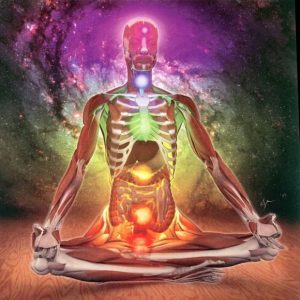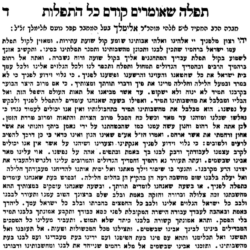Contributor(s): Shared on: Categories: Tags: אדם קדמון Adam Ḳadmon, Amoraic prayers, אשר יצר Asher Yatsar, Asiyah, Bathroom etiquette, Bathroom Prayer, Body as Cosmos, Body as Earth, Body as Society, Body as Temple, devotional interpretation, English Translation, excretion, four worlds, internal plumbing, interpretive translation, Late Antiquity, plumbing as metaphor, Prayers in the Babylonian Talmud, Prayers of Pumbedita | Source (Hebrew) | Translation (English) |
|---|
בָּרוּךְ אַתָּה
יְיָ אֱלֹהֵינוּ
מֶלֶךְ הָעוֹלָם,
אֲשֶׁר יָצַר
אֶת הָאָדָם
בְּחָכְמָה,
וּבָרָא בוֹ
נְקָבִים נְקָבִים,
חֲלוּלִים חֲלוּלִים,
|
I worship You,
Yah, our God,
Cosmic Majesty.
You formed me,
A human being,
So wisely.
You created in me
All kinds of
Hollows and ducts,
Inner organs and intestines. |
גָּלוּי וְיָדוּעַ
לִפְנֵי כִסֵּא כְבוֹדֶךָ,
שֶׁאִם
יִסָּתֵם אֶחָד מֵהֶם,
אוֹ אִם
יִפָּתֵחַ אֶחָד מֵהֶם,
אִי אֶפְשַׁר
לְהִתְקַיֵּם
אֲפִילוּ שָׁעָה אֶחָת.
|
As I am all transparent to You,
It is apparent and clear,
That if any of these
That need to be open would clog,
Or any of these
Which need to be enclosed
Would seep,
I could not exist and live
In Your sight,
Not even for a moment. |
בָּרוּךְ אַתָּה יְיָ
רוֹפֵא כָל בָּשָׂר
וּמַפְלִיא לַעֲשֹוֹת:
|
So I am grateful
And bless You,
For healing me,
In amazing ways. |
This English translation of the prayer “Asher Yatsar” by Rabbi Zalman Schachter-Shalomi z”l, was first published in his Siddur Tehillat Hashem Yidaber Pi (2009). Versification by Aharon Varady according to the nusaḥ ha-ARI z”l. For the earliest variations of “Asher Yatsar,” consult Talmud Bavli Berachot 60b: | Source (Hebrew) | Translation (English, William Davidson Talmud, adapted) |
|---|
הנכנס לבית הכסא אומר
התכבדו מכובדים קדושים משרתי עליון
תנו כבוד לאלהי ישראל
הרפו ממני עד שאכנס ואעשה רצוני ואבא אליכם
אמר אביי לא לימא אינש הכי דלמא שבקי ליה ואזלי אלא לימא
שמרוני שמרוני
עזרוני עזרוני
סמכוני סמכוני
המתינו לי המתינו לי עד שאכנס ואצא שכן דרכן של בני אדם
כי נפיק אומר
ברוך אשר יצר את האדם בחכמה
וברא בו נקבים נקבים חללים חללים
גלוי וידוע לפני כסא כבודך
שאם יפתח אחד מהם או אם יסתם אחד מהם
אי אפשר לעמוד לפניך
|
One who enters a bathroom says [to the angels who accompany him at all times]:
Be honored, honorable holy ones, servants of the One on High,
give honor to the elo’ah of Yisra’el,
leave me until I enter and do my will and come back to you.
Abayyé said: A person should not say this, lest they abandon him and go. Rather he should say:
Guard me, guard me,
help me, help me,
support me, support me,
wait for me, wait for me until I enter and come out, as this is the way of man.
Upon exiting, one says:
Blessed…Who formed man in wisdom,
and created in him many orifices and cavities.
It is revealed and known before the throne of Your glory
that were one of them to be ruptured or blocked,
it would be impossible to stand before You. |
מאי חתים
אמר רב רופא חולים
אמר שמואל קא שוינהו אבא לכולי עלמא קצירי אלא רופא כל בשר
רב ששת אמר מפליא לעשות
א”ר פפא הלכך נמרינהו לתרוייהו רופא כל בשר ומפליא לעשות
|
The Gemara asks: With what should one conclude this blessing?
Rav said: One should conclude: Blessed…Healer of the sick.
Shmuel said: Abba, Rav, has rendered everyone sick. Rather, one should say: Healer of all flesh.
Rav Sheshet said: One should conclude: Who performs wondrous deeds.
Rav Pappa said: Therefore, let us say them both: Healer of all flesh, Who performs wondrous deeds. |
Source(s)
 Rabbi Dr. Zalman Meshullam Schachter-Shalomi, affectionately known as "Reb Zalman" (28 August 1924 – 3 July 2014) was one of the founders of the Jewish Renewal movement. Born in Żółkiew, Poland (now Ukraine) and raised in Vienna, he was interned in detention camps under the Vichy Regime but managed to flee the Nazi advance, emigrating to the United States in 1941. He was ordained as an Orthodox rabbi in 1947 within the ḤaBaD Hasidic movement while under the leadership of the sixth Lubavitcher Rebbe, Yosef Yitzchok Schneersohn, and served ḤaBaD communities in Massachusetts and Connecticut. He subsequently earned an M.A. in psychology of religion at Boston University, and a doctorate from the Hebrew Union College. He was initially sent out to speak on college campuses by the Lubavitcher Rebbe, but in the early 1960s, after experimenting with "the sacramental value of lysergic acid", the main ingredient in LSD, leadership within ḤaBaD circles cut ties with him. He continued teaching the Torah of Ḥassidut until the end of his life to creative, free and open-minded Jewish thinkers with humility and kindness and established warm ecumenical ties as well. In September 2009, he became the first contributor of a siddur to the Open Siddur Project database of Jewish liturgy and related work. Reb Zalman supported the Open Siddur Project telling its founder, "this is what I've been looking forward to!" and sharing among many additional works of liturgy, an interview he had with Havurah magazine in the early to mid-1980s detailing his vision of " Database Davenen." The Open Siddur Project is proud to be realizing one of Reb Zalman's long held dreams.  Oft-quoted in the Babylonian Talmud, Abayyé (also, Abaye, Hebrew: אַבַּיֵי) was an Amoraic rabbi born about the close of the 3rd century CE and who died 339 CE. His father, Kaylil, was the brother of Rabbah bar Naḥmani, a teacher at the Yeshiva (Rabbinic Academy) of Pumbedita. Abayyé's real name was Naḥmani, after his grandfather. Left an orphan at an early age, he was adopted by his uncle, Rabbah bar Naḥmani, who nicknamed him Abayyé ("Little Father"), to avoid confusion (perhaps out of respect for his father) with his grandfather of the same name; thenceforth he was known as Abayyé, without any other title. It is a curious fact that he perpetuated the memory of his foster-mother by mentioning her name in many popular recipes and dietetic precepts. He introduced each recipe with the phrase, "My mother told me." Abayyé's teachers were his uncle Rabbah and Yosef bar Ḥama, both of whom successively became presidents of the Pumbedita Academy. When Yosef died (324 CE), this honor was conferred upon Abayyé, who retained it until his death some five years later. Rabbah trained him in the application of the dialectic method to halakhic problems, and Yosef, with his stores of traditional lore, taught him to appreciate the value of positive knowledge. (adapted from wikipedia) Aharon Varady (M.A.J.Ed./JTSA Davidson) is a volunteer transcriber for the Open Siddur Project. If you find any mistakes in his transcriptions, please let him know. Shgiyot mi yavin; Ministarot naqeni שְׁגִיאוֹת מִי־יָבִין; מִנִּסְתָּרוֹת נַקֵּנִי "Who can know all one's flaws? From hidden errors, correct me" (Psalms 19:13). If you'd like to directly support his work, please consider donating via his Patreon account. (Varady also translates prayers and contributes his own original work besides serving as the primary shammes of the Open Siddur Project and its website, opensiddur.org.) Read a comment / Leave a comment (moderated) Works of related interest: |













Leave a Reply